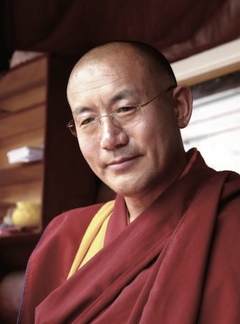Conversation with Khenpo Tsultrim Lodrö
The Essence of a Conversation with Khenchen Tsultrim Lodrö
by Khenpo Chimé Rigdzin
I went to visit Khenpo Tsultrim Lodrö, and we had some light-hearted conversation, telling jokes and so on.
Then, at one point, he said to me, 'I don’t know whether I have long to live, so unlike in the past when I focused on elaborate textual study and so forth, now is the time to put more effort into practices like mind training.'
I told him, 'You will surely live a long time, because you ransom the lives of so many animals every year.'[1]
He replied, 'When I ransom lives, I don’t even think about my own worldly interest, such as living long. If there is some slight notion of self-interest, like the idea of purifying my own misdeeds, I say to myself, "I can do a separate practice to purify my obscurations. Can I do this ransoming of lives without the slightest trace of self-serving motivation and only the purest concern for others?" It is with this thought that I exert myself. For this reason, I don’t know whether ransoming lives will benefit my longevity.
'Generally speaking, saving the life of a single animal is not considered to be hugely beneficial. But by putting amṛta in their mouths, placing takdrol (liberation through wearing)[2] on their heads, and reciting special mantras and dhāraṇīs in their ears, and making sincere prayers of aspiration, we plant the pure seed of liberation in their minds.'
Those who read this should keep in mind that virtue according to the Mahāyāna refers to such pure intention and action. It is therefore extremely important that you do not simply make a show of bringing benefit to others while sincerely pursuing your own interests.
Your mind is beautified by pure and flawless discipline.
Your intelligent mastery of the ten sciences is vast.
Spiritual friend and protector of all downtrodden beings.
Live long, I pray, as an adornment of this southern continent.[3]
| Translated by Adam Pearcey, 2024.
Version: 1.1-20240322
-
On the practice of 'ransoming' the lives of animals, which is to say, releasing them from captivity, see Chatral Rinpoche, The Benefits of Saving Lives. ↩
-
Tib. btags grol. One of the five methods that lead to liberation without the need for meditation. There are numerous kinds of takdrol, including mantras in diagrams or the text of a tantra. They are sometimes worn in a locket and can also be placed on a deceased person's body after death and either buried or burned with the body, in order to alleviate suffering during the bardo. ↩
-
i.e., Jambudvīpa, this world of ours. ↩
